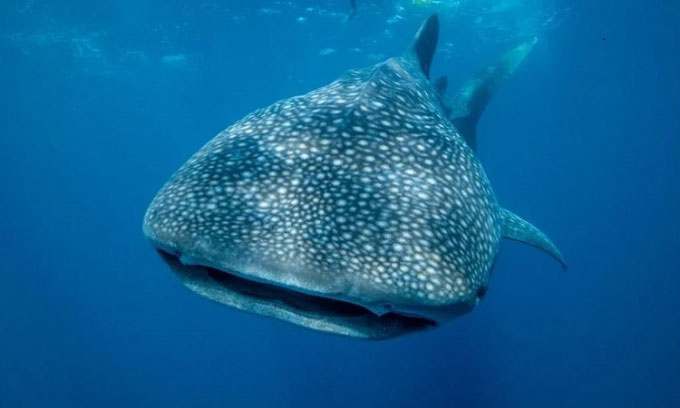Marine scientists discover that besides filter-feeding on mollusks, whale sharks also consume plants like algae, making them the largest omnivorous species on the planet.

Whale sharks at Ningaloo Reef consume a large amount of seaweed. (Photo: Australian Institute of Marine Science)
Whale sharks are filter feeders, and scientists have long observed them consuming mollusks at Ningaloo Reef off the coast of Western Australia. However, when researchers analyzed biopsy samples from whale sharks living around the reef, they discovered that these creatures actually consume a significant amount of plant matter. “This makes us rethink everything we knew about the diet of whale sharks,” said Dr. Mark Meekan, a biologist at the Australian Institute of Marine Science. Meekan and his colleagues detailed the whale shark’s diet on July 19 in the journal Ecology.
This discovery positions whale sharks, which can grow up to 18 meters long, as the largest omnivorous animals in the world. “On land, the largest animals are all herbivores. In the ocean, we have always assumed that large animals like whales and whale sharks feed on shrimp-like creatures and small fish. Perhaps the evolutionary systems on land and in water are not the same,” Meekan stated.
To accurately determine what whale sharks eat, the research team collected potential food samples from the reef, ranging from small plankton to seaweed. They then compared the amino acids and fatty acids in the plankton and plants with the compounds found in whale sharks’ bodies. According to Meekan, whale shark tissue contains compounds found in Sargassum, a type of brown algae at Ningaloo. The researchers believe that over time, whale sharks have developed the ability to digest algae trapped in their intestines.
Dr. Andy Revill, an organic geochemist at the Commonwealth Scientific and Industrial Research Organisation (CSIRO) in Australia, analyzed whale shark tissue using stable isotopes. This technique allowed the research team to investigate the energy sources that help whale sharks grow. They also used nets to collect whale shark feces for analysis. The fecal samples revealed that while they consume mollusks, they do not metabolize many of these food types.


















































